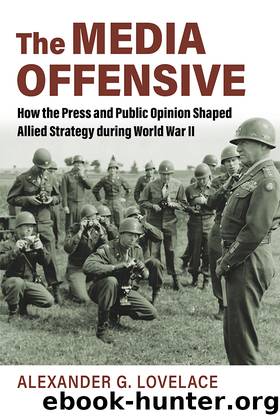The Media Offensive by Alexander G. Lovelace

Author:Alexander G. Lovelace [Alexander G. Lovelace]
Language: eng
Format: epub
Publisher: University Press of Kansas
Published: 2022-06-06T00:00:00+00:00
The Master, the Master Plan, and the Unmastered Press
On June 12, Eisenhower, accompanied by Henry Arnold, Ernest King, and George Marshall, landed in Normandy. They were met by Bradley and a gaggle of reporters. King angrily turned to Eisenhower and demanded to know why the correspondents were present.154 At least one of the photographers was also nonplused and recalled being told what was each generalâs âgood sideâ to photograph.155 It must have worked since Butcher received a request at 2:00 a.m. the next morning to release the photos, and reported that the âcorrespondents are delighted with their stories, although the London papers played the contemporary visit of the P.M. to Monty and mostly overlooked that of General Ike and party.â156 The day before, Ernie Pyle and other American correspondents had complained to Bradley about the BBC bias toward the British forces. Bradley promised to speak to Eisenhower or Churchill about the problem.157 This alleged British press favoritism can be considered the opening shot of a press battled waged between the Allied correspondents. Since the real battle of Normandy quickly devolved into a stalemate, the media would deploy plenty of criticism. This, in turn, filtered back into commandersâ actions in Normandy.
Since Bradley was at the center of both conflicts, his relationship with the media merits some attention. Like Eisenhower, Bradley fits well into Brian Linnâs âManagerâ category, and historians have generally viewed the homely and modest Bradley as the antithesis to the showy and publicity-hungry Patton. One recent biographer has even gone so far as to claim that Bradley âdid not seek out publicity as others had doneâ and that âhis life has been neglected largely because most media outlets dubbed him unexciting or mundane.â158 Yet, if the reminiscences of reporters are any guide, Bradley was extremely well regarded by the press.159 The cynical Joe Liebling of the staid New Yorker allegedly claimed, âBradley was the greatest man after Christ to hit this world.â160 âThe outstanding figure on this western front is Lt. Gen. Omar Nelson Bradley,â Ernie Pyle wrote in September 1944. âHe is so modest and sincere that he probably will not get his proper credit, except in military textbooks.â161 Indeed, fear that Bradleyâs apparent disinterest in publicity would damage his place in posterity was as much a part of the Bradley legend as the âGI General.â But the legend conceals one of the most adroit handlers of the press in World War II. As veteran-turned-scholar Paul Fussell observes, âBradley . . . seemed entirely homespun and guileless, but he equipped himself with a public-relations staff as able as any.â162 The most important of these was Chester B. Hansen, a former reporter himself, whose wife worked at Time magazine.163 Bradleyâs own wife was close friends with Mary Margaret McBride of NBC.164 After the war, Bradley admitted that Hansen was useful as a âpublic relations officer, and he soon became acquainted with all the correspondents that were with our headquarters. He found out what they were thinking, what they wanted to know.
Download
This site does not store any files on its server. We only index and link to content provided by other sites. Please contact the content providers to delete copyright contents if any and email us, we'll remove relevant links or contents immediately.
Asking the Right Questions: A Guide to Critical Thinking by M. Neil Browne & Stuart M. Keeley(5762)
Autoboyography by Christina Lauren(5228)
Eat That Frog! by Brian Tracy(4526)
Dialogue by Robert McKee(4389)
Sticky Fingers by Joe Hagan(4189)
Journeys Out of the Body by Robert Monroe(3619)
Annapurna by Maurice Herzog(3464)
Full Circle by Michael Palin(3443)
Schaum's Quick Guide to Writing Great Short Stories by Margaret Lucke(3376)
Elements of Style 2017 by Richard De A'Morelli(3343)
The Art of Dramatic Writing: Its Basis in the Creative Interpretation of Human Motives by Egri Lajos(3063)
Atlas Obscura by Joshua Foer(2955)
Why I Write by George Orwell(2945)
The Fight by Norman Mailer(2930)
The Diviners by Libba Bray(2927)
In Patagonia by Bruce Chatwin(2922)
The Mental Game of Writing: How to Overcome Obstacles, Stay Creative and Productive, and Free Your Mind for Success by James Scott Bell(2904)
Venice by Jan Morris(2570)
The Elements of Style by William Strunk and E. B. White(2470)
